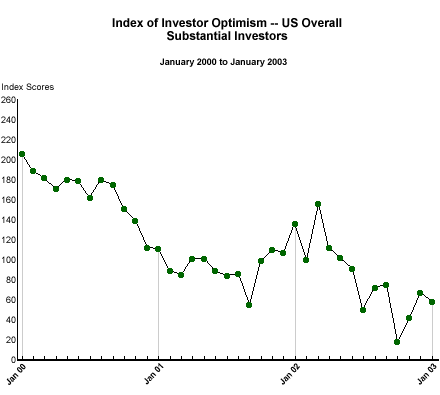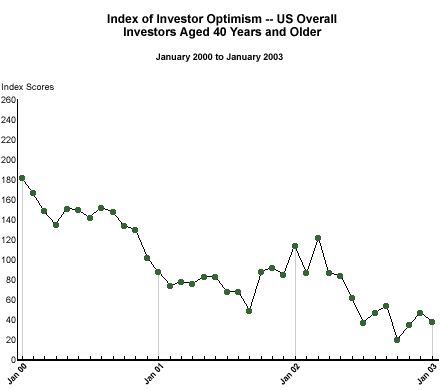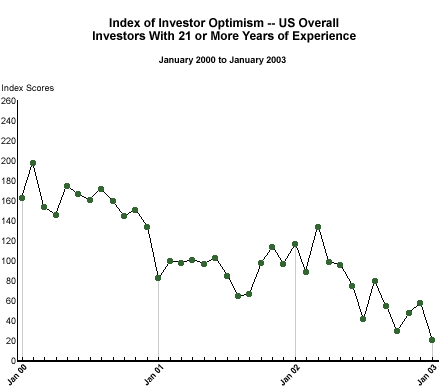A year ago, the U.S. economy was enjoying the benefits of the post-Sept. 11 rally effect, as economic growth and investor confidence surged. Unfortunately, this surge in economic activity failed to gain critical momentum, leaving us with a completely different situation in January 2003. Economic activity is now stagnant at best. The equity markets have broken significant support levels and appear headed for another test of their October lows. And investor confidence has fallen far below where it was a year ago, according to the Index of Investor Optimism -- a joint effort of UBS and The Gallup Organization*.
Investor Optimism Is Far Below a Year Ago
The overall Index of Investor Optimism -- U.S. is now at 38 -- the second-lowest point since its inception in October 1996. The corresponding Index for European EU5 countries is at -37 -- also its second-lowest point since October 2001. Both Indexes are down 75 points from January 2002.
Even more significantly, U.S. investor optimism is significantly lower now than it was a year ago among all key investor groups:
- The overall Index among "substantial" investors -- those with $100,000 or more of investable assets -- has fallen from 135 in January 2002 to 57 this month.
- The overall Index among older investors -- those aged 40 years of age and older -- has dropped from 113 in January 2002 to 37 in January 2003.
- The overall Index among the most experienced investors -- those with 21 years of experience or more -- fell 96 points over the past 12 months.
The fact that substantial investors, older investors, and the most experienced investors in the United States -- not to mention European investors -- are significantly less optimistic than they were a year ago, does not bode well for the current economic outlook.
Optimism Among ‘Substantial' Investors Is Much Lower . . .
Overall optimism among substantial investors reached 205 in January 2000. During the following year, it declined steadily to 110 in January 2001, and continued falling to 54 in September 2001. Following Sept. 11, substantial investor optimism increased during late 2001 and early 2002, reaching 155 in March 2002. But by October, substantial investor optimism had fallen to a six-year low of 17. The overall substantial investor Index increased to 41 in November and 66 in December before falling to 57 this month.
Substantial investor optimism decreased along both its Personal and Economic Dimensions in January. The Personal Dimension decreased from 59 in December to 52 in January, and the Economic Dimension decreased from 7 to 5.

. . . As Is Optimism Among Older Investors . . .
Overall optimism among older investors has followed a trend similar to that among substantial investors. It reached 181 in January 2000 and continued falling to 48 in September 2001. After Sept. 11, 2001, older investors grew steadily more optimistic -- the trend reached 121 by March 2002, but plummeted to 19 in October 2002. Overall, the Index for older investors rose in November and December 2002, but has fallen again to 37 this month.

. . . And Optimism Among Experienced Investors
Overall optimism among the most experienced investors has also followed a similar trend over the past two years, although this group is currently even more pessimistic than both substantial investors and older investors. Optimism among these most experienced investors currently stands at 20 -- its lowest point since the Index's inception.

Bottom Line
The big, immediate-term issue facing markets worldwide is potential war with Iraq and its resulting impact on the U.S. economy. Discussion of possible war dominated the Global Economic Summit last week, and will probably abound as the president gives his State of the Union address and the Fed holds two days of policy meetings this week. Given this context, it is not surprising that many economic observers attribute the current economic difficulties to war worries. Clearly, there are significant costs associated with today's geopolitical uncertainties.
Still, investor sentiment has been declining for a long time both in Europe and the United States, despite the New Year's rally in the equity markets in early January. The equity markets have plunged during the past two weeks, and if this change in market sentiment persists in early February, we can expect investor optimism, like the equity markets to test its October lows next month.
The world's economic leaders will make a big mistake if they decide to take a wait-and-see approach to the economy during the coming weeks. Instead, they should do everything they can to stimulate economic growth now and hope that any anticipated rally effect will simply add to the economic momentum their efforts create.
*Results are based on telephone interviews with 1,000 investors, aged 18 and older, conducted Jan.1-15, 2003. For results based on the total sample of investors, one can say with 95% confidence that the margin of sampling error is ±3%.
